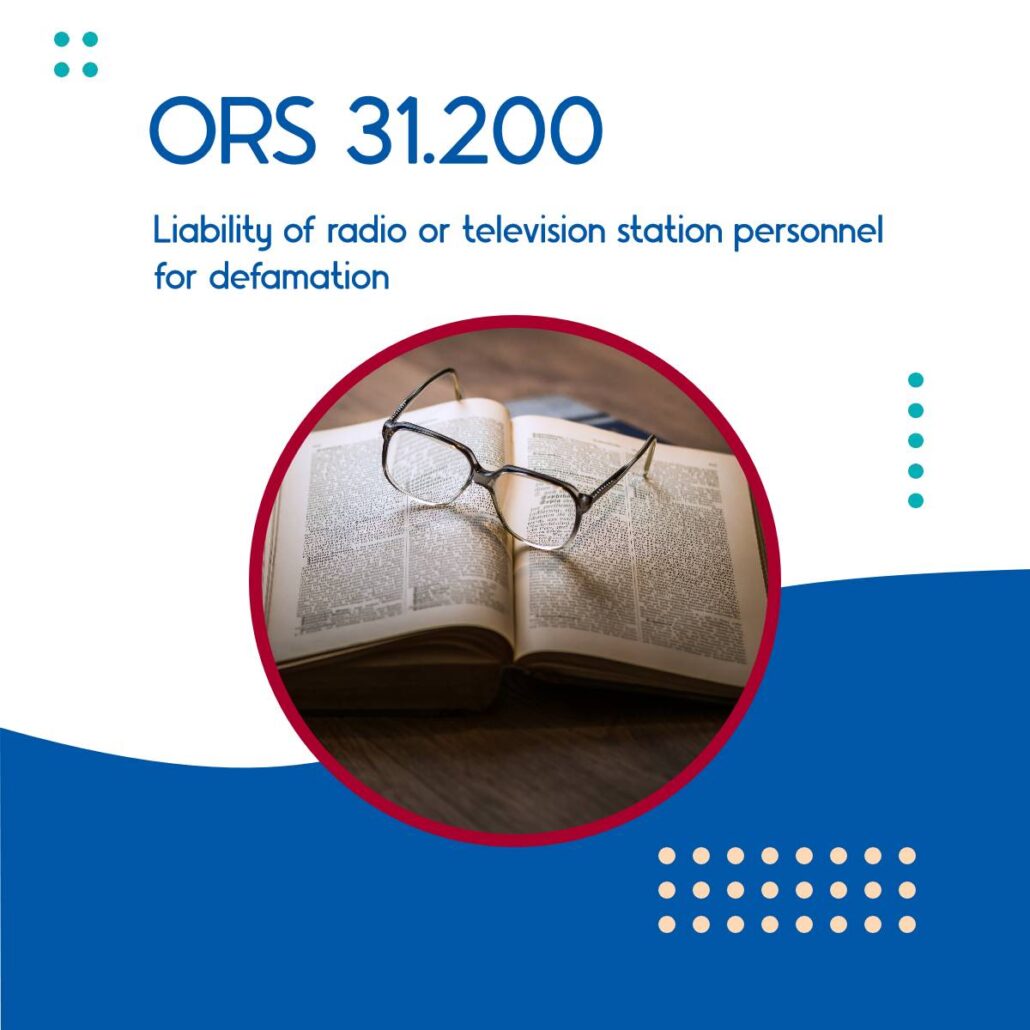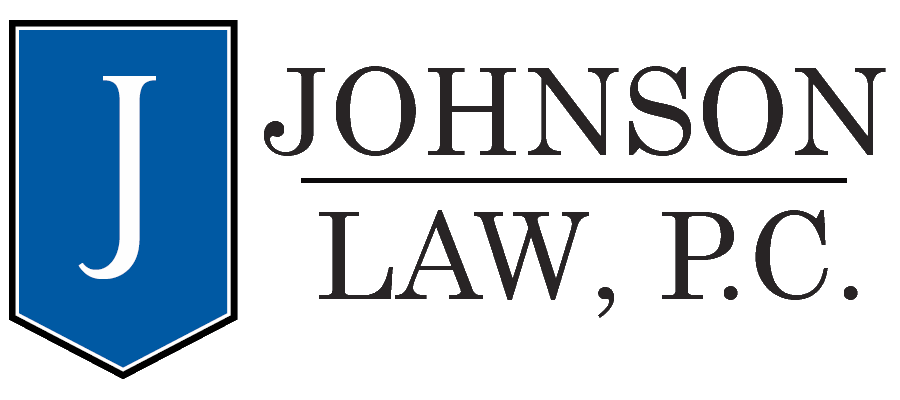ORS 31.200 Summary And Explanation
ORS 31.200 outlines the liability conditions for radio or television station personnel in cases of defamation. It specifies that the owner, licensee, operator, and their agents or employees are not liable for defamatory statements made by others in broadcasts unless it can be proven they did not exercise due care to prevent the statement's broadcast. Furthermore, it states that these personnel cannot be held liable for defamatory statements made in broadcasts by candidates for public office, as these broadcasts are protected from censorship by federal law and FCC regulations.
Disclaimer: This is not legal advice, we are not your attorneys. To hire an attorney and get legal advice please contact us for a free personal injury consultation.
Imagine turning on your favorite radio show or TV program, only to hear a guest make a shocking statement about someone you know. In the world of broadcasting, where words fly as swiftly as the speed of sound, how do we balance the freedom of speech with the need to protect individuals from harm?

Enter ORS 31.200, Oregon's beacon of protection for broadcasters against defamation claims. This law not only shields your beloved stations and their staff but also sets a standard for responsible communication. But what happens when the line between free speech and defamation is crossed? Let's dive into the heart of ORS 31.200 and uncover how it stands guard at this crucial intersection.
Understanding ORS 31.200: A Closer Look
ORS 31.200 deals with specific legal protections for radio and television broadcasting stations in Oregon, particularly regarding defamation. Defamation involves making false statements about someone that could harm their reputation. This law sets guidelines on when these broadcasters can be held liable (or legally responsible) for such statements made on their platforms.
1. General Protection Against Liability
Firstly, the law recognizes that owners, operators, and their staff at radio and TV stations broadcast a wide range of content, including guest opinions. It establishes that:
- Stations are not automatically liable: If a guest makes a defamatory statement during a broadcast, the station and its staff are not immediately held responsible for this. The rationale is recognizing the practical limits of control over every word spoken by guests.
- Due Diligence is Required: However, there's a catch. The station and its employees must show they took reasonable steps to prevent such defamatory statements from being aired. This means they should have some form of content oversight or editorial process to filter out harmful content.
2. Special Rules for Political Broadcasts
The law goes further to address a unique scenario involving political candidates:
- Exemption for Political Speech: When it comes to political candidates speaking on air, the station's liability is further limited. Even if a candidate says something defamatory, the station isn't liable due to federal regulations that protect political speech. This ensures candidates can express their views without undue censorship, aligning with principles of free speech and democratic debate.
- Why This Matters: This exemption acknowledges the importance of an open, robust discussion in a democratic society, especially during election times. It balances the need to protect individuals' reputations with the public's right to hear candid discussions and critiques from those seeking office.
What This Means for You
For broadcasters, ORS 31.200 is a crucial legal shield. It acknowledges that while broadcasters have a responsibility to prevent harmful content, they also operate in a realm where open dialogue, including critical and sometimes controversial statements, is fundamental. It places the onus on broadcasters to practice due diligence without stifling free expression, especially in the politically charged atmosphere of electoral campaigns.
For the public and individuals potentially affected by defamation, this law underscores the complexity of balancing free speech with protecting against harm to reputation. It also highlights the specific considerations given to political discourse, reflecting its central role in a democratic society.
In essence, ORS 31.200 is about finding equilibrium: ensuring that broadcasters can facilitate wide-ranging discussions without becoming the de facto censors of public discourse, while also holding them to a standard of responsibility in managing the content they air.
ORS 31.200 Text
ORS 31.200 Liability of radio or television station personnel for defamation
(1) The owner, licensee or operator of a radio or television broadcasting station, and the agents or employees of the owner, licensee or operator, shall not be liable for any damages for any defamatory statement published or uttered in a radio or television broadcast, by one other than the owner, licensee or operator, or agent or employee thereof, unless it is alleged and proved by the complaining party that the owner, licensee, operator, agent or employee failed to exercise due care to prevent the publication or utterance of such statement in such broadcast.
(2) In no event shall any owner, licensee or operator of a radio or television broadcasting station, or any agent or employee thereof, be liable for any damages for any defamatory statement published or uttered by one other than such owner, licensee, operator, agent or employee, in or as part of a radio or television broadcast by any candidate for public office, which broadcast cannot be censored by reason of federal statute or regulations of the Federal Communications Commission. [Formerly 30.150]”
ORS 31.200
ORS 31.200 FAQ:
Q: What is defamation, and how does it relate to broadcasting?
A: Defamation involves making false statements about someone that can harm their reputation. In broadcasting, this can happen if a guest or a program falsely accuses someone of something damaging on the air.
Q: Who does ORS 31.200 protect?
A: ORS 31.200 protects radio and TV stations, including their owners, licensees, operators, and employees, from being held liable for defamatory statements made by others during broadcasts.
Q: Are there any exceptions to this protection?
A: Yes, if the broadcasting station or its staff did not exercise due care to prevent the defamatory statement from being aired, they could be held liable. This means they need to be reasonably careful about what gets broadcast.
Q: What does "due care" mean in the context of ORS 31.200?
A: "Due care" refers to the level of effort and caution that a reasonable person or organization would exercise to avoid broadcasting defamatory content. This might include reviewing content before it airs or having policies in place to handle potentially defamatory statements.
Q: Does ORS 31.200 provide absolute immunity for political broadcasts?
A: Yes, broadcasters are not liable for defamatory statements made by candidates for public office during their broadcasts. This provision supports the free exchange of political ideas, even if those ideas include criticisms that could be seen as defamatory outside of the political context.
Q: How does ORS 31.200 affect the average viewer or listener?
A: For viewers and listeners, ORS 31.200 ensures that broadcasters can provide a platform for a wide range of voices and opinions, including political discourse, without the constant fear of defamation lawsuits. It promotes a vibrant, open dialogue in the media, crucial for a healthy democracy.
Q: Where can I find more information or get help if I believe I've been defamed on a broadcast?
A: If you believe you've been defamed on a broadcast, it might be helpful to consult with a legal professional who specializes in defamation law. They can provide guidance based on your specific situation and help you understand your rights and options.
Related Laws
When discussing ORS 31.200 and its impact on defamation claims against broadcasters, it's essential to consider other laws and regulations that interact with or complement this statute. Understanding these related laws helps provide a fuller picture of the legal landscape governing broadcasting, free speech, and defamation.
1. Federal Communications Commission (FCC) Regulations: The FCC oversees interstate and international communications by radio, television, wire, satellite, and cable in the United States. FCC regulations are crucial for broadcasters, as they set guidelines for content, including what constitutes indecency or obscenity, and outline the responsibilities of broadcasters to ensure fair and balanced coverage, especially during political campaigns.
2. Communications Decency Act, Section 230: This federal law provides immunity to online platforms from being held liable for content posted by their users. While it primarily applies to internet services, understanding Section 230 is essential as it sets a precedent for the concept of platform immunity, similar to the protections provided to broadcasters under ORS 31.200.
3. Defamation Laws: Defamation laws vary by state but generally define what constitutes a defamatory statement and outline the criteria for a statement to be considered as such, including falsity and harm. Understanding the specifics of Oregon's defamation laws, alongside ORS 31.200, helps clarify when a broadcaster might be liable for content aired on their platforms.
4. The Fairness Doctrine (Repealed): Although the Fairness Doctrine, which required broadcasters to present contrasting viewpoints on controversial issues of public importance, was repealed in 1987, its historical significance remains relevant. It underscores the evolving approach to balancing free speech with the public's right to diverse information in broadcasting.
5. State Shield Laws: Many states have enacted shield laws that protect journalists from being compelled to reveal their sources in court. While not directly related to defamation, these laws contribute to the broader context of media protections and responsibilities, emphasizing the importance of journalistic integrity and the role of media in society.
6. Right to Privacy Laws: These laws protect individuals from unwarranted public disclosure of private facts and intrusion into their private lives. When discussing defamation and broadcasting, it's important to consider how right to privacy laws intersect with the freedom of speech and press, potentially influencing what can be legally aired.
7. Anti-SLAPP (Strategic Lawsuit Against Public Participation) Legislation: Many states have passed Anti-SLAPP laws to protect individuals and entities from lawsuits intended to censor, intimidate, and silence critics by burdening them with the cost of a legal defense. Understanding Anti-SLAPP legislation is crucial for broadcasters as it offers protection when airing content that could invite defamation claims, particularly in matters of public interest.
We will review your case for free.
Pay us nothing unless we get you a better settlement.
We work on contingency.

